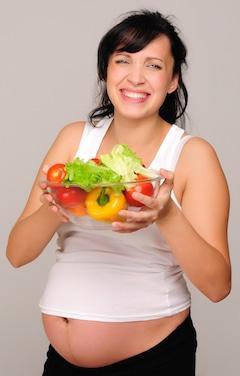
You've probably heard the phrase ‘eating for two’ as it relates to a pregnant woman. Expectant mothers may wonder how much they need to eat during pregnancy and which foods are the best.
Pregnant women should eat more calories to support the extra energy that is used to help the baby develop (1).
When women are expecting, they also need a different micronutrient intake than women who are not pregnant (2).
Studies show that even in developed countries, pregnant women may not get enough folate, iron and vitamin D (2).
If women don’t get the right nutrients while pregnant, their baby’s development may be affected. Eating vital nutrients can also lower the risk of disease later in the baby's life (3, 4).
Consuming the right foods when you’re pregnant will help ensure the health of you and the baby. Below are some of the most nutritious foods that you can eat when you’re pregnant.
Before we move onto the 13 best foods for pregnant women, let's talk about how much you should eat and the essential nutrients needed.
Test your knowledge now or come back after reading this article to check your learning:
How Much Should You Eat When You’re Pregnant?
Pregnant mothers need to eat more to support the growing fetus. Gaining weight during pregnancy is normal.
Most pregnant women will gain weight due to the extra weight of the fetus, placenta and additional fluids.
Certain maternal tissues also expand or increase in volume, causing weight gain. Pregnant women also gain fat stores while pregnant (5).
When you’re pregnant, the body becomes better at absorbing nutrients from the foods that you eat. You probably don’t need to eat more calories in the first trimester (6).
Gaining too much weight early on in the pregnancy may put you at risk for gestational diabetes (7, 8).
Gestational diabetes is a type of diabetes, or the inability of your body to properly use insulin to regulate blood sugar, which develops during pregnancy and goes away after the birth of the child.
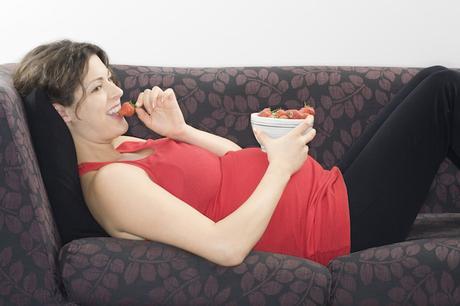
Gestational diabetes may put the child at a greater risk of developing hypertension, diabetes or cardiovascular disease later in life (9, 10).
Gaining too much weight during pregnancy can also make it harder for the mother to lose the weight after the baby is born (11).
How Many Calories Does a Pregnant Woman Need?
The Food and Nutrition Board of the Institute of Medicine recommends that pregnant women add about 350 calories to their daily intake in the second trimester and 500 calories in the third trimester (5, 6).
The baby’s brain grows rapidly in the third trimester, making it especially important for mothers to get adequate nutrients during this stage (12).
Eating more when pregnant doesn't mean just adding empty calories to your diet. It is important to eat nutrient-rich foods to support your health and the health of your baby.
KEY POINT: Pregnant mothers typically need to eat more food to support the growing fetus and get additional nutrients.
What Are the Nutrients Needed During Pregnancy?
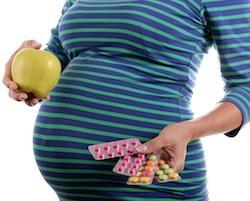
Pregnant women should consume a variety of minimally processed foods to ensure adequate nutrient and calorie intake.
Some nutrients are more important than others during pregnancy, including the following:
Iodine
This nutrient is necessary for the proper development of the bones and brain. Iodized salt contains this nutrient and is commonly used in most industrialized countries (12, 13, 14)
Iron
Iron deficiency is the most common nutritional deficiency in the world, and pregnant women are at a higher risk of iron deficiency.
Iron helps the blood carry oxygen throughout the body and supports healthy immunity, growth, and development (13).
Iron deficiency in early childhood can negatively affect brain development (12, 14)
Zinc
Zinc is essential for immunity and development.
Some studies have found that supplementing zinc in pregnant women and young children can help with motor development and cognitive functioning. However, the evidence is still largely inconclusive (13).
Vitamin B-12
This vitamin is only found naturally in animal products.
Although there aren't many studies that look into B-12 deficiency in pregnant women or infants, a few observational studies have found a link between B-12 deficiency and poor cognitive performance (13).
Vitamin B-6
A deficiency in this vitamin can cause slower infant growth and increased fussiness in babies. Mothers who are deficient in vitamin B-6 may not respond to their babies' crying as readily (12).
Vitamin A
Deficiency in this vitamin is a leading cause of blindness in children (12, 14).
Folate
This nutrient is important for preventing neural tube defects (12).
KEY POINT: Some of the key nutrients that pregnant women should consume during pregnancy are iodine, iron, zinc, vitamin B-12, vitamin B-6, vitamin A and folate.
13 Foods To Eat When Pregnant
Here are 13 healthy foods to eat while you're pregnant:
1. Dairy Products Provide Calcium and Friendly Bacteria
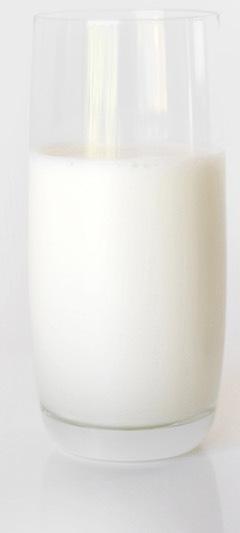
Many people associate dairy products with calcium. However, they are also a convenient source of other nutrients.
It is recommended that pregnant women eat more calcium to support the growing baby (15) . Vitamin D, which is often found in dairy products, can also support bone health for the baby and the mother (16).
Women who are sensitive to lactose may find it easier to digest yogurt because it contains active probiotics that consume most of the lactose in the product (17, 18). Eating Greek yogurt is an ideal way to get calcium and protein from a dairy product.
Many types of yogurt contain friendly bacteria that help improve digestive health and eliminate digestive distress (19, 20, 21).
In fact, supplementing with probiotics during pregnancy can protect against gestational diabetes, preeclampsia, infections and allergic diseases. It can even prevent excessive weight gain during pregnancy (22).
KEY POINT: Consuming dairy products can help pregnant women get enough calcium. Eating yogurt with live cultures can help women take in probiotics that have many health benefits.
Infographic (Pin, Share or Embed)

Share This Infographic On Your Site
<p><a href='https://www.authoritydiet.com/best-healthy-foods-eat-while-youre-pregnant/'><img src='https://www.authoritydiet.com/images/i/best-pregnant-foods-infographic-hd.jpg' border='0' /></a><br /><strong>Please include attribution to AuthorityDiet.com with this graphic.</strong></p>
2. Eggs Contain Almost Every Nutrient
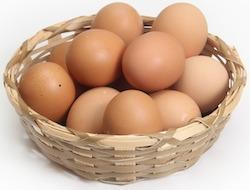
Pregnant women who are looking to add calories by consuming more nutrient-dense foods can achieve this goal by eating eggs.
One large hard-boiled egg contains (23):
- Calories: 77
- Protein: 6 g
- Vitamin A: 6% DV
- Calcium: 2% DV
- Iron: 3% DV
- Omega-3 Fatty Acids: 39 mg
Eggs are an excellent source of choline. Although different people need different amounts of choline, most pregnant women don’t get enough (24). More than 90% of Americans don’t consume enough choline (25).
Choline plays a critical role during fetal development. It helps build a strong and healthy spinal cord and may be responsible for memory function throughout the baby’s life (26, 27).
It is suggested that pregnant women consume about 450 mg of choline a day. One whole egg contains about 113 mg of choline or 25% DV of choline (28).
KEY POINT: Eggs contain protein, vitamin A, calcium, iron, omega-3 fatty acids and choline.
3. Sweet Potatoes Provides Vitamin A
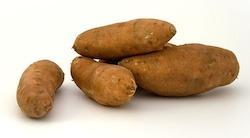
One cup of baked sweet potato contains 769% of the recommended daily value of vitamin A. It also contains 8% DV of calcium and 8% DV of iron (29).
Vitamin A is crucial for the growth of a healthy fetus (30). In fact, experts recommend that pregnant women consume about 10 to 40% more vitamin A while pregnant (31, 32, 33).
However, consuming excess vitamin A from animal products can be toxic. Therefore, eating more plant-based sources of vitamin A (beta-carotene) may be preferable (34). This is because beta-carotene is converted in the body to vitamin A on an as-needed basis.
The fiber in sweet potatoes can help support digestive health and regularity. It can also improve satiety and keep blood sugar from spiking, which can help with pregnancy cravings and manage gestational diabetes (35, 36, 37).
KEY POINT: Sweet potatoes are a good source of beta-carotene, fiber, calcium, and iron. Beta-carotene converts to vitamin A in the body whenever required.
4. Legumes Provides Folate and Calcium
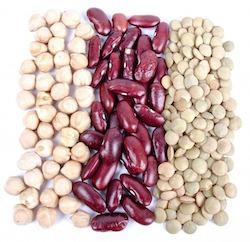
Legumes are dry fruits that grow inside of a shell or a pod. Beans are the most commonly recognize type of legume. However, peas, alfalfa, and peanuts are also legumes.
Legumes provide calcium, protein, iron and folate. Many women don’t eat enough folate during pregnancy (38, 39).
Adding legumes to their diet can boost their folate levels and prevent problems like low birth weight and neural tube defects in the baby.
Folate deficiency can also make the child more likely to contract diseases later in life (40, 41).
Let’s look at the nutrients in some common types of legumes.
One cup of dry roasted unsalted peanuts contains the following nutrients (42):
- Calories: 160
- Protein: 7 g
- Fiber: 2 g
- Calcium: 15 mg (2% DV)
- Iron: .6 mg (4% DV)
- Folate: 40 mcg (10% DV)
One cup of black beans contains the following nutrients (43):
- Calories: 230
- Protein: 15g
- Fiber: 15g
- Calcium: 46 mg (5% DV)
- Iron: 3.6 mg (20% DV)
- Folate: 256 mcg (64% DV)
Pregnant women are more likely to suffer from constipation. The fiber in legumes can help keep bowel movements regular and comfortable.
KEY POINT: Legumes provide vital nutrients that can help prevent birth defects and help women maintain regular bowel movements during pregnancy.
5. Salmon Contains Brain-Building Fatty Acids
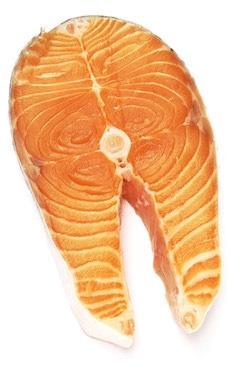
Omega-3 fatty acids, especially DHA and EPA, are crucial building blocks for a baby’s brain and retina (44).
However, most people who eat a traditional Western diet don’t consume enough omega-3s (45, 46).
Three ounces of wild Atlantic salmon contain more than 2,000 mcg of omega-3 fatty acids. This amount also contains 5% of the DV of iron (47).
However, it is recommended that pregnant women eat less than 340 grams a week of fish and seafood to limit the levels of mercury they consume. Therefore, many people don’t eat enough fish to consume the recommended amount of omega-3s (48).
Three ounces is equivalent to 85 grams. Researchers found that eating a serving of fatty fish two to three times per week can help pregnant women take in the recommended amount of omega-3 fatty acids while still falling below the suggested seafood consumption levels (49, 50).
Salmon is a rich source of vitamin D (51). Wild-caught salmon contains more vitamin D than farmed salmon. Just 3.5 ounces of wild salmon may contain 500 to 1,000 IU of vitamin D, whereas the same amount of farmed salmon may only contain up to 250 IU (52).
Vitamin D is important for supporting many of the body’s functions, and many people don’t get enough of it (53, 54).
KEY POINT: Salmon contains omega-3 fatty acids and vitamin D, which are crucial for baby’s development. Most people don’t consume enough of these nutrients.
6. Lean Meat Delivers Iron and Other Nutrients
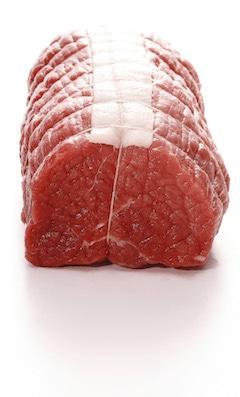
Lean cuts of beef, pork and chicken provide protein, iron, choline and vitamin B.
As a pregnant woman’s blood volume increases, so does her demand for dietary iron, especially in the last few months of pregnancy (55).
Getting insufficient iron during the early and middle stages of a pregnancy can cause iron deficiency anemia. This condition increases the risk of premature birth and low birth weight (56).
Meat with strong flavor or smell can become less appetizing to women when they are pregnant (57, 58).
One cup, or 140 grams, of chicken breast contains 8% DV of iron (59). The same amount of top sirloin steak contains only slightly more iron than that (60). Therefore, pregnant women who have a meat aversion can still consume iron by eating milder chicken rather than red meat.
KEY POINT: Lean meat is rich in many nutrients, including iron, which is extremely important during pregnancy.
7. Dark, Leafy Green Vegetables Are Rich in Nutrients and Fiber
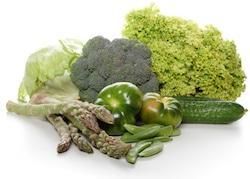
Dark, leafy, green vegetables, like spinach, collard greens and broccoli, contain many important nutrients.
For example, one cup of raw spinach contains the following (61):
- Calories: 7
- Fiber: 1 g
- Protein: 1 g
- Vitamin A: 56% DV
- Calcium: 3% DV
- Vitamin C: 14% DV
- Iron: 5% DV
- Vitamin K: 181% DV
- Folate: 15% DV
- Omega-3 Fatty Acids: 41 mg
Consuming green, leafy vegetables has also been associated with larger birth weight and head circumference in infants (62, 63).
If you cook the leafy greens, you’ll typically end up consuming more than if you eat them raw. This can help boost the amount of fiber you eat, preventing constipation, which plagues at least 25% of pregnant women (64).
Eating leafy greens can add important nutrients such as folate to your dietary intake without adding many calories.
KEY POINT: Leafy green veggies, including broccoli, are packed with nutrients and have few calories.
8. Berries Are a Great Sweet Treat for Immunity
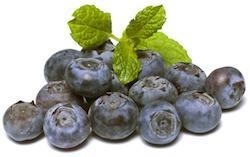
Berries are full of water, antioxidants and vitamin C.
Vitamin C helps you absorb iron. If you experience iron deficiency during pregnancy, eating meat along with some berries may help.
Vitamin C can help you stay healthy, especially if you’re pregnant during cold and flu season (65, 66).
Berries are packed with antioxidants. These anthocyanins are anti-inflammatory and may keep you healthier over time (67, 68, 69, 70, 71).
The anthocyanins in blueberries may also help regulate blood sugar and insulin sensitivity (72, 73, 74). This can make them an ideal snack if you have gestational diabetes.
Berries also provide fiber and can satisfy a sweet tooth. However, they have relatively few calories, especially when compared with other sweet treats.
KEY POINT: Berries contain water, vitamin C, antioxidants and fiber. This can make them ideal for supporting optimal health while pregnant.
9. Fish Oil Provides Omega-3s

Fish oil is often taken as a supplement. It is derived from fish livers and is rich in omega-3 fatty acids. As discussed earlier, omega-3s are vital for a baby’s brain and retinal development (44).
Fish oil is also a natural source of vitamin D. Women who don’t eat seafood or have an aversion to fish during pregnancy can still reap the benefits by taking fish oil supplements.
In fact, pregnant women who don’t consume enough vitamin D may be more likely to develop preeclampsia. This is a type of high blood pressure caused by the pregnancy. It can be dangerous for both mother and baby (75, 76).
One observational study found that women who supplemented with cod liver oil early in their pregnancies gave birth to heavier babies. Higher birth weight is associated with a reduce risk of disease later in life (77).
Too much vitamin A may lead to birth defects. Therefore, it is recommended that pregnant women consume no more than 3,000 mcg of retinol, the type of vitamin A found in fish oil, per day (77).
One tablespoon of cod liver oil contains just over 4,000 mcg of vitamin A (78). High levels of omega-3 may also thin the blood, which could be dangerous especially during a surgical birth (79).
Therefore, a pregnant woman could take a scant tablespoon or even a teaspoon a day to ensure adequate consumption of the vitamin.
KEY POINT: A little less than a tablespoon a day of fish oil delivers the vitamin A and omega-3s necessary for a healthy pregnancy, fetus and birth.
10. Avocados Are Calorie Dense and Nutritious
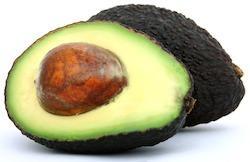
Avocados are high in monounsaturated fatty acids, fiber, folate, vitamin K and vitamin C. They are relatively high in calories, but they contain many vital nutrients.
The fatty acids in avocados help the fetus develop strong and healthy skin and brain cells. The folate in the avocados may lower the risk of certain birth defects (80).
One avocado contains 20% DV of potassium (81). This is actually more potassium than bananas have. Regulating potassium balance in the body may help prevent leg cramps, which are common in pregnancy (82).
KEY POINT: Avocados are packed with nutrients that can help improve health and relieve painful leg cramps during pregnancy.
11. Whole Grains Provide Higher Quality Calories
If you’re having trouble taking in enough calories while pregnant, you can take in more energy by eating whole grains. Whole grains have more fiber and nutrients than their refined counterparts.
When you think of whole grains, you don’t have to limit yourself to whole-wheat products. Oats and quinoa is high-protein grains. If you don’t eat meat or have an aversion to it during pregnancy, eating oats or quinoa can help you satisfy dietary protein requirements.
Also, whole-grain foods may be enriched with folate, which is important for pregnant women (83).
KEY POINT: Whole grains contain fiber, protein and folate. They are relatively calorie dense, which may be beneficial especially in the last two trimesters.
12. Water is Vital During Pregnancy

A woman’s blood volume increases significantly when she is pregnant. That makes it even more important to stay hydrated during pregnancy (84, 85).
Mild dehydration may not affect the fetus, but it could leave you feeling less than ideal.
How can you tell if you’re dehydrated? You may experience the following symptoms (86, 87, 88):
- Headaches
- Anxiety or restlessness
- Fatigue
- Moodiness
- Fogginess
Drinking enough water can prevent you from getting urinary tract infections, an uncomfortable side effect in some pregnancies (89, 90).
It is especially important to maintain adequate hydration if you are experiencing nausea during pregnancy. Drinking enough water can help with constipation too.
You can get water by drinking the beverage or by eating fresh fruits and vegetables. Drinking decaffeinated herbal tea can also help you stay hydrated.
KEY POINT: It’s important to stay hydrated when you’re pregnant to support increased blood volume and reduce the risk of constipation and urinary tract infections.
13. Dried Fruit May Assist Labor
Dried fruit is high in calories and sugar, but it contains a great deal of fiber. It’s easy to eat several dried apricots, for example. However, one or two fresh apricots may fill you up.
Because you can typically eat more dried fruit in one sitting than fresh, you take in more fiber when eating dried fruit. However, you may need to watch your sugar intake.
Dried fruit can do more than just keep you healthy. Studies show that eating dates in the last three months of pregnancy can help your cervix dilate, facilitating labor (91, 92).
KEY POINT: Dried fruit can add calories and nutrients to your diet. Eating dried dates can even facilitate labor. Just don’t overdo it on dried fruit, or you’ll take in too much sugar.
Bottom Line
When you eat well during pregnancy, you’ll feel better. You’ll also be more likely to stay healthy and encourage healthy development in your child.
You don’t have to increase your caloric intake by much, but you can gradually increase it by adding nutrient-rich foods to your diet as your pregnancy progresses.
Get the energy you need in the form of healthy foods to stay nourished during your pregnancy.
Is there any foods I have missed? Let me know what you think in the comments.

